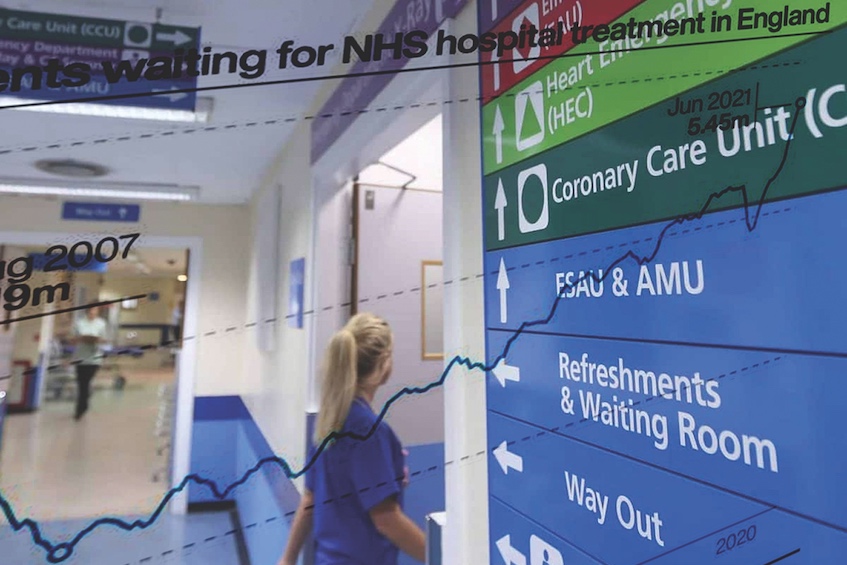Government to draw up national plan to tackle staff shortages

Health secretary Jeremy Hunt has unveiled plans for a new national workforce strategy for the NHS in England, to tackle staff shortages and ensure the supply of skilled healthcare professionals in the years ahead.
Speaking to the NHS Providers conference on 8 November, Hunt said the government would bring together NHS England, Health Education England (HEE), NHS Improvement and NHS Employers to “to provide a whole system view of workforce pressures and how they will be tackled”. HEE is leading work on the strategy and a single document setting out the government’s plans is expected to be published in the new year.
The government has previously rejected calls for a national strategy, with ministers arguing that the Department of Health’s role should be limited to co-ordinating existing work done by arm’s-length bodies such as HEE and NHS England.
Recent reports by NHS Providers, the King’s Fund, and other think tanks and royal colleges have revealed mounting pressures on staffing levels among nurses, doctors and other clinical professions as well as senior managers and IT staff. Official figures have also shown a sharp drop in the number of EU staff joining the NHS since Britain voted to leave the EU in June 2016.
MiP chief executive Jon Restell called on the government to consult with trade unions and professional bodies in drawing up the strategy.
“It’s obviously good news that ministers and other system leaders now agree that the NHS needs a coherent national workforce strategy.” he said. “We need to start with a realistic analysis of where we are now and where we should be, and where the key gaps are – otherwise it will lack credibility.
“The lack of money to keep up with demand, the negative impact of pressures and workload on employee experience, Brexit, and recruitment and retention need to be broached openly. We need to avoid creating a long, undeliverable wish list and we must give attention to the whole NHS team and the vital social care workforce. A long consultation period with good engagement with unions will help to create decent strategic priorities for the NHS.”
The announcement was also welcomed by Jennifer Dixon, chief executive of the Health Foundation. “As our latest report, Rising Pressure, made clear, we need to move away from short-term announcements and put in place a workforce strategy that gives those working for the NHS what they need to meet the considerable challenges they face.
|
Agenda for Change, introduced 20 years ago, was supposed to put an end to inconsistency and unfairness in how NHS staff are paid. But staff shortages and tight budgets mean many staff are now graded below the level of the work they’re doing. It’s time to modernise the system, says Rhys McKenzie.
07 October 2024
| By Rhys McKenzie
Feature
|
|||||
|
Special Report: People in public-facing jobs are being confronted by more violence and abuse at work, and the NHS is at the sharp end. Existing policies are failing – we need a more co-ordinated and energetic approach to tackle the root causes and protect the staff who care for others.
18 September 2024
| By Craig Ryan
Feature
|
|||||
|
Reflecting on our own assumptions and behaviour is the first step towards inclusive leadership, writes Ramima Khanam. By putting ourselves in other people’s shoes and learning from conversations we can help to create more inclusive and productive workplaces.
18 July 2024
| By Ramima Khanam
Feature
|
|||||
|
ELECTION 2024:We look at what the experts say about six key challenges facing the NHS: waiting lists, workforce, social care, reform, buildings and technology. Do Labour or the Conservatives have the policies to meet them?
18 June 2024
| By Rhys McKenzie & Craig Ryan
Feature
|
|||||
|
ELECTION 2024:As polling day nears, Jon Restell and Rhys McKenzie set out MiP’s agenda for the next government: supporting the workforce, stabilising the health and care system, boosting productivity and giving managers freedom to do their jobs.
17 June 2024
| By Rhys McKenzie & Jon Restell
Feature
|
|||||
|
Under pressure from political demands and relentless organisational change, many board-level NHS managers are feeling the effects of burnout and contemplating leaving the NHS, according to MiP’s ’Sounding Board’ of senior members and the union’s evidence to the pay review body.
22 April 2024
| By Rhys McKenzie
Feature
|
|||||
|
Thinly-staffed NHS mental health services are under intense pressure, with patients facing interminable waits for diagnosis and treatment. Could artificial intelligence and chatbots be part of the answer? What are the risks and what does this largely-unregulated new technology mean for patients and staff?
17 April 2024
| By Craig Ryan
Feature
|
|||||
|
The government wants to attract thousands more staff into the NHS through apprenticeships. But uncertainty over funding, teaching staff and local autonomy could undermine the plans before they get off the ground.
05 January 2024
| By Jessica Bradley
Feature
|
|||||
|
Burnout is a finally being recognised as a serious problem in the NHS and many other workplaces. But what is burnout, what causes it and how can we prevent it? Rhys McKenzie reports.
11 December 2023
| By Rhys McKenzie
Feature
|
|||||
|
The NHS is still struggling to recover from the pandemic, but studies show productivity was falling even before the Covid shock. We asked the experts: what’s driving this, does it matter and why are managers vital to turning productivity around?
20 October 2023
| By Craig Ryan
Feature
|
|||||
|
|
Agenda for Change, introduced 20 years ago, was supposed to put an end to inconsistency and unfairness in how NHS staff are paid. But staff shortages and tight budgets mean many staff are now graded below the level of the work they’re doing. It’s time to modernise the system, says Rhys McKenzie.
07 October 2024
| By Rhys McKenzie
Feature
|
|||||
|
Special Report: People in public-facing jobs are being confronted by more violence and abuse at work, and the NHS is at the sharp end. Existing policies are failing – we need a more co-ordinated and energetic approach to tackle the root causes and protect the staff who care for others.
18 September 2024
| By Craig Ryan
Feature
|
|||||
|
Reflecting on our own assumptions and behaviour is the first step towards inclusive leadership, writes Ramima Khanam. By putting ourselves in other people’s shoes and learning from conversations we can help to create more inclusive and productive workplaces.
18 July 2024
| By Ramima Khanam
Feature
|
|||||
|
ELECTION 2024:We look at what the experts say about six key challenges facing the NHS: waiting lists, workforce, social care, reform, buildings and technology. Do Labour or the Conservatives have the policies to meet them?
18 June 2024
| By Rhys McKenzie & Craig Ryan
Feature
|
|||||
|
ELECTION 2024:As polling day nears, Jon Restell and Rhys McKenzie set out MiP’s agenda for the next government: supporting the workforce, stabilising the health and care system, boosting productivity and giving managers freedom to do their jobs.
17 June 2024
| By Rhys McKenzie & Jon Restell
Feature
|
|||||
|
Under pressure from political demands and relentless organisational change, many board-level NHS managers are feeling the effects of burnout and contemplating leaving the NHS, according to MiP’s ’Sounding Board’ of senior members and the union’s evidence to the pay review body.
22 April 2024
| By Rhys McKenzie
Feature
|
|||||
|
Thinly-staffed NHS mental health services are under intense pressure, with patients facing interminable waits for diagnosis and treatment. Could artificial intelligence and chatbots be part of the answer? What are the risks and what does this largely-unregulated new technology mean for patients and staff?
17 April 2024
| By Craig Ryan
Feature
|
|||||
|
The government wants to attract thousands more staff into the NHS through apprenticeships. But uncertainty over funding, teaching staff and local autonomy could undermine the plans before they get off the ground.
05 January 2024
| By Jessica Bradley
Feature
|
|||||
|
Burnout is a finally being recognised as a serious problem in the NHS and many other workplaces. But what is burnout, what causes it and how can we prevent it? Rhys McKenzie reports.
11 December 2023
| By Rhys McKenzie
Feature
|
|||||
|
The NHS is still struggling to recover from the pandemic, but studies show productivity was falling even before the Covid shock. We asked the experts: what’s driving this, does it matter and why are managers vital to turning productivity around?
20 October 2023
| By Craig Ryan
Feature
|
|||||
|
Related News
-

MiP responds to the abolition of NHS England
Government risk repeating same mistakes as Lansley by abolishing NHS England and cutting more staff from ICBs, says MiP.
-

NHS England and central staff could be cut by 50%, NHSE has announced
Government planned cuts at NHS England go much further than previously announced, with up to 50% of staff at risk.
-

New MiP survey shows growing support for principle of regulating managers, but warns it won’t improve patient safety
MiP’s member survey on regulating NHS managers shows managers are still not convinced regulation will improve patient safety or raise standards, despite growing support for it in principle.









